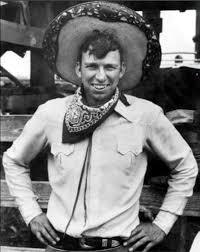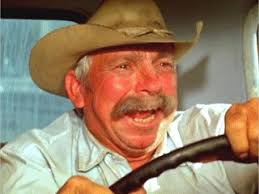
I like the photo above because it provides one justification for the screen name of western actor Slim Pickens (Louis Burton Lindley Jr, 1919-1983). He actually was slim at one time (those of us who knew him originally in his later performances may recall quite a large pot belly). There is another source for the name, possibly apocryphal. According to Pickens, when he competed in his first rodeo as a teenager he was told by the manager that that’s what he could expect his winnings to be: slim pickin’s. When Lindley actually took home a $400 purse from the competition, he figured the phrase was lucky and kept it as his handle. Throughout the late 1930s and early ’40s Pickens got his first performance experience — as a rodeo clown, which was dangerous but entertaining work. During World War Two he was assigned to a radio station, enhancing his show biz skills.
Born and bred on a California dairy ranch, Pickens was a natural horseman, and he did all his own riding in the western films in which he began appearing in 1946. Most of his over 170 screen credits are in westerns (or comedy westerns or other comedies that make use of his cow poke identity). Many of his early films were B movies where he served as a comical sidekick to stars like Rex Allen and others. Towards the end of the ’50s he guested on tv shows like Annie Oakley, The Lone Ranger, Cheyenne, Death Valley Days, et al which raised his profile even more. This led to roles in the more “grown-up” westerns they’d begun making, like The Sheepman (1958) with Glenn Ford, Marlon Brando’s One-Eyed Jacks (1961), Major Dundee (1965) with Charlton Heston, the 1966 re-make of Stagecoach (in the Andy Devine role), Will Penny (1967) again with Heston, The Ballad of Cable Hogue (1970) with Jason Robards, The Cowboys (1972) with John Wayne, Sam Peckinpah’s Pat Garret and Billy the Kid (1973), The White Buffalo (1977) with Charles Bronson, and Tom Horn (1980) with Steve McQueen. Later TV western work included guest shots on Bonanza, The Virginian, Gunsmoke, Alias Smith and Jones, How the West Was Won, and The Sacketts.

We haven’t yet mentioned the slightly important fact that Slim Pickens was very funny, in fact, I imagine most people consider him primarily a comic actor. But I wanted to establish his bona fides first. He was a decent actor, and played plenty of straight roles in some great films. But fairly early on his persona was smartly used by several directors in comedies, and those parts are among his best remembered performances. These include Stanley Kubrick’s Doctor Strangelove (1964), Otto Preminger’s Skidoo (1968), Mel Brooks Blazing Saddles (1974), and Steven Spielberg’s 1941 (1979). In his later years, he wound up in a lot of hokum that included several Disney movies (including 1975’s The Apple Dumpling Gang), as well as Banjo Hackett: Roaming Free (1976), Smokey and the Good Time Outlaws (1978), and a recurring role on B.J. and the Bear and The Misadventures of Sheriff Lobo. Oddments included The Getaway (1972) with Steve McQueen , The Irwin Allen disaster films The Swarm (1978) and Beyond the Poseidon Adventure (1979), Willie Nelson’s Honeysuckle Rose (1980), and Joe Dante’s The Howling (1981). His last theatrical film was Pink Motel (1982) with Phyllis Diller.

You must be logged in to post a comment.